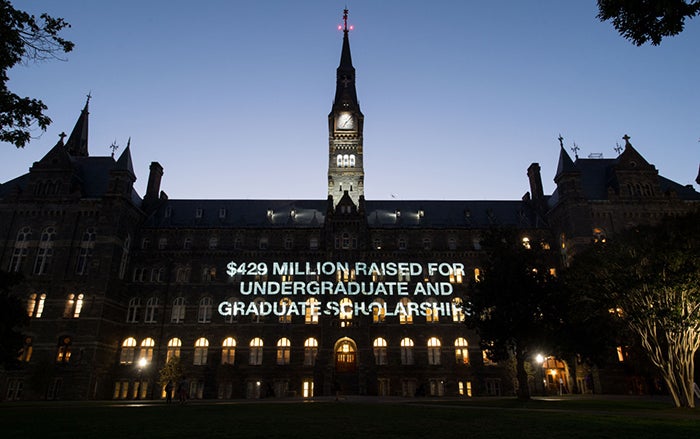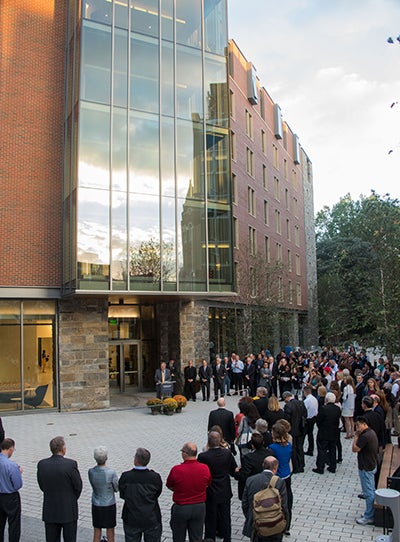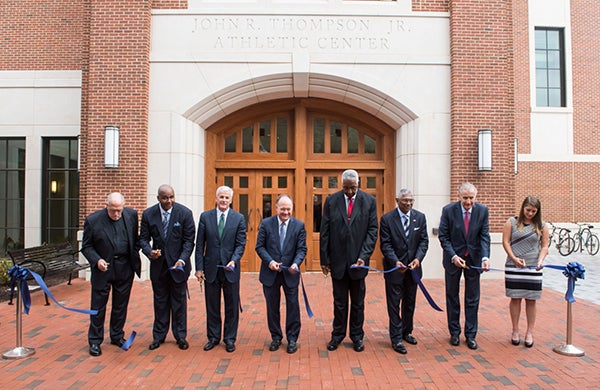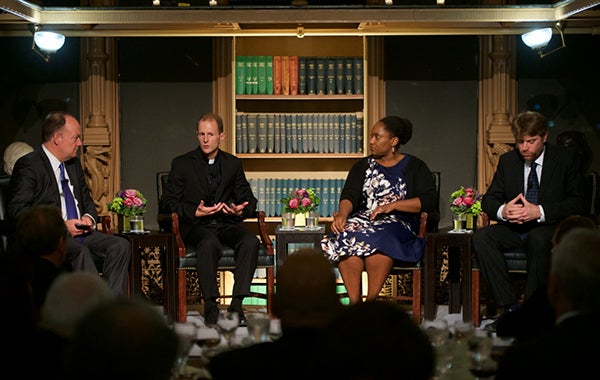Title: Board Celebrates Successful Capital Campaign, Dedication of New Buildings
Georgetown’s board of directors meets on campus as the university celebrates securing $1.67 billion through its capital campaign, dedicates two new buildings in the same week and spends time with members of the university’s Working Group on Slavery, Memory and Reconciliation.

October 14, 2016 – Georgetown’s board of directors met on campus last week as the university celebrated securing $1.67 billion through its capital campaign, dedicated two new buildings in the same week and spent time with members of the university’s Working Group on Slavery, Memory and Reconciliation.
“We could not have achieved the success of this recent capital campaign without the more than 190,000 alumni and supporters who contributed to this effort,” said Georgetown President John J. DeGioia.
Better Prepared Than Ever

For Generations to Come: The Campaign for Georgetowncame to a successful close on June 30 and exceeded its goal of $1.5 billion – an accomplishment made possible through the support of alumni, parents, volunteers, friends, students, faculty and staff.
“During theGenerationscampaign, our community made transformative commitments across all of our campuses, investing in scholarships, faculty and academic programs, student experiences, research and capital projects,” said Bart Moore, vice president of Advancement at Georgetown, in a statement to the university community. “Because of the tremendous generosity of our donors, our university is now better prepared than ever before to meet new challenges and to seize opportunities.”
The board joined Georgetown students, faculty and staff Oct. 5 for the official dedication of the 225-bed Pedro Arrupe, S.J. Hall, which opened to students this fall.
This summer the board approved naming the new eight-story suite-style residence hall after the man known as the second founder of the Jesuits. Arrupe served as the 28th general of the Society of Jesus and led the Jesuits through a tumultuous period of ecclesial and cultural renewal after the Second Vatican Council.
Transformative Spaces
“As a residential campus, many formative experiences for our students happen outside of the classroom. It is our hope that the experiences that happen here are informed and shaped by the spirit of Father Arrupe, by a call to be women and men for others,” DeGioia said.

The university began construction on Arrupe Hall in 2014 just as it also broke ground on the
The university began construction on Arrupe Hall in 2014 just as it also broke ground on the John R. Thompson Jr. Intercollegiate Athletic Center – named for Georgetown’s legendary head basketball coach.
Through philanthropy, the Thompson center opened this fall to Georgetown’s student athletes, and alumni gathered for the building’s Oct. 6 ribbon-cutting ceremony along with former basketball players coached by Thompson, student athletes and other members of the university community.
“This state-of-the-art 144,000 square-foot facility will transform the athletic experience at Georgetown by providing our 750 student athletes with the spaces and technology necessary to compete at the highest level of intercollegiate sport,” said Georgetown Athletics Director Lee Reed.
A Path Forward for Racial Justice
The board later spent time with the university’s Working Group on Slavery, Memory and Reconciliation. DeGioia interviewed three working group members – Rev. Matthew Carnes, S.J., associate professor of government and in the School of Foreign Service; Marica Chatelain, associate professor of history; and Adam Rothman, professor of history – about their recommendations made in the Slavery, Memory and Reconciliation working group report.

Last month, the Georgetown president announced the working group’s recommendations and next steps in the ongoing process to acknowledge and respond to the university’s historical ties to the institution of slavery and its path toward racial justice.
“It was a tremendous privilege to share the experience of the working group with the members of the board,” said Carnes, chair of the working group. “I believe the board caught a glimpse of how the working group brought together scholarly expertise with a deep commitment to Georgetown and its values in a spirit of honest, humble inquiry and shared responsibility for accompanying the community on its path forward.”
Other Board Business
Rev. Howard Gray, S.J., interim vice president of mission and ministry, delivered an overview to the board on the 36th General Congregation that convened earlier this month to select the new superior general for the Jesuits. The current superior general, Rev. Adolfo Nicolás, S.J., announced his intention to resign in December of 2014.
Three board members – Rev. Ben Nebres, S.J., Rev. Francois-Xavier Dumortier, S.J. and Rev. Agbonkhianmeghe Emmanuel Orobator, S.J. – are serving as delegates at the congregation until a new leader is elected. A fourth board member, Rev. Daniel Villanueva, S.J. is working in communications at the Congregation.
Faculty department chairs Carol Benedict, professor of history; Charles King, professor of government and international affairs; and Frank Vella, professor of economics, also delivered presentations to the board that highlighted department research and accolades.
The board also approved a 3.5 percent increase in summer undergraduate and graduate tuition in the School of Continuing Studies (SCS) that will take effect at the beginning of 2017.
The increase in SCS graduate tuition will be equalized with the current tuition for programs in the Graduate School of Arts and Sciences while the undergraduate increase will keep programs competitive with peer institutions.